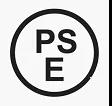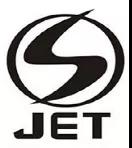PSE (Product Safety of Electrical Appliance & Materials) certification (called "fitness inspection" in Japanese) is a mandatory market access system for electrical appliances in Japan and an important content stipulated in the "Electrical Appliances Safety Law" in Japan. The electrical appliances are divided into "specific electrical appliances" and "non-specific electrical appliances", of which "specific electrical appliances" include 116 products; "non-specific electrical appliances" include 341 products, and the technical requirements include EMC and safety.
All products in the "Specified Electrical Appliances" catalog entering the Japanese market must be certified by a third-party certification body authorized by the Ministry of Economy, Trade and Industry of Japan, obtain a certification certificate, and affix a diamond-shaped PSE mark on the nameplate, as shown in the following figure:

For products in the "non-specific electrical appliances" catalog, entering the Japanese market must go through self-testing and self-declaration to confirm compliance with the Japanese electrical appliances technical standards, and affix a round PSE mark on the nameplate, as shown in the figure below :

List of documents to be submitted to apply for PSE certification
1. PSE certification application form;
2. Factory inspection questionnaire (when applying for specific electrical appliances);
3. A copy of the business license of the applicant, manufacturer, and production plant;
4. Product manual;
5. A description of the differences between products of various models in the same application unit;
6. List of key components and/or main raw materials;
7. Product size drawing, assembly drawing and size drawing of each part;
8. The authorization certificate issued by the manufacturer (when applicable);
9. Other required documents.
Covered product range
Class A PSE specific electrical appliance certification scope
1) Wires and cables, fuses, wiring appliances (electrical accessories, lighting appliances, etc.), current limiters, transformers, ballasts;
2) Electric heating appliances, electric power application mechanical appliances (household appliances), electronic application mechanical appliances (high frequency epilator);
3) Other AC electrical machinery and appliances (electrical insect killer, DC power supply device), portable engine;
Class B Japanese non-specific electrical PSE certification scope
Japan’s circular PSE mark certified products, any products that are included in the “non-specific electrical appliances” catalogue entering the Japanese market must be tested by a laboratory accredited by the Ministry of Economy, Trade and Industry of Japan to confirm that they meet the Japanese electrical appliances technical standards and obtain a qualified test report PSE certificate, the PSE circular logo can be affixed to the product, and the product can be sold in the Japanese market.
2. S-Mark voluntary certification
All electrical appliances exported to Japan must pass PSE certification, similar to China’s 3C certification, which is a compulsory certification. Products sold in Japan are divided into regulated products and non-regulated products. Regulated products are required to apply for the PSE mark compulsorily, while non-regulated products can choose to apply for S-Mark freely. Wire products such as power cords need to apply for F-Mark. Laser product parts need to apply for PSC Mark.
Certification brief
S-Mark is applicable to all electronic and electrical products, and the scope covers the certification scope of PSE. It is recommended to apply for non-control products and products that are not within the scope of PSE certification. Although S-Mark is a voluntary certification, it is currently favored by more and more manufacturers. Through S-Mark, it can obtain a competitive advantage in the market. S-Mark also covers the safety part and the electromagnetic compatibility test part. JET, the Japan Electrical Safety & Environment Technology Laboratories (Japan Electrical Safety & Environment Technology Laboratories) and JQA (Japan Quality Assurance Organization) can currently carry out S-Mark certification work, and their marks are S-JET Mark and S- JQA Mark.
application process
1. Customers provide samples and related application materials
2. Submit samples to the laboratory for testing
3. Audit
4. The certification body reviews the test report and the factory inspection report
5. Issue S-mark certificate

other information
Technical information: voltage frequency AC 100V/200V, 50Hz /60Hz
Is it mandatory: voluntary
Certificate validity period: no validity period, annual review maintains validity
Factory inspection requirements: the first factory inspection and annual inspection are required
Certificate holder requirements: no requirement
Guangzhou Saida Testing---Focusing on the field of testing and certification for 15 years, has its own CNAS accredited laboratory, and has a professional service team to ensure that your products successfully pass the PSE certification and complete the METI filing of the Ministry of Economy, Trade and Industry. Your product enters the Japanese market to escort. If you have testing or certification needs, please feel free to write or call us at any time. We will provide your company with a certification program in the shortest possible time. If Saida has the opportunity to provide the required services for your company, it will be a great honor!
Guangzhou Saida Testing Technology Co., Ltd.
Unit 703, Tianan Energy-saving Technology Park Development Building, 555 Panyu Avenue North, Panyu District, Guangzhou
Ms. Shao Miaoyan
Mobile phone: 15013068956
Email: cs3@certitek.cn
Add.:Room703、705/7F, Development Building, Tian An Hi-Teck Ecological Park, No.555 North Road Panyu Avenue, Panyu District, Guangzhou City, 511400, China
Tel.:020 - 39211670 Fax:020 - 39211640 E-mail:info@certitek.cn

